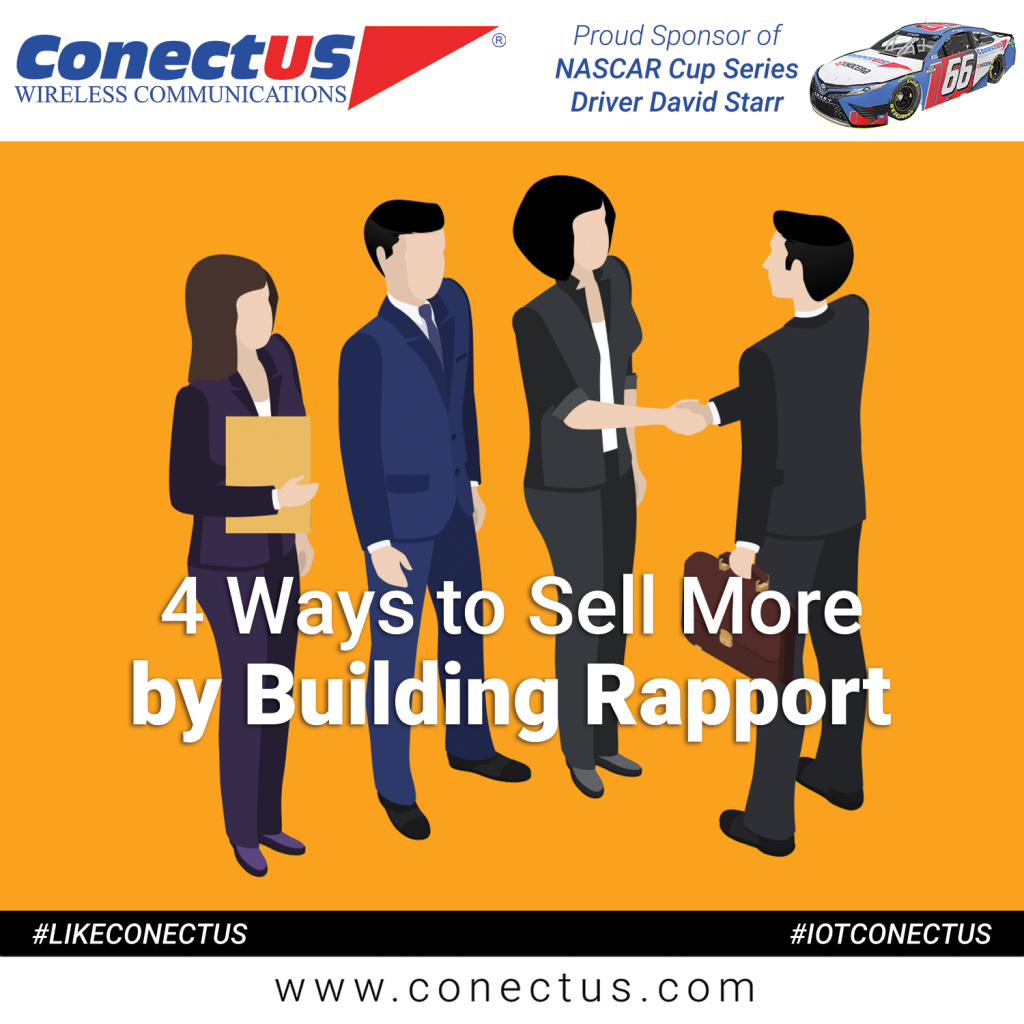Building rapport is often a much overlooked critical part of the sales process. In fact, without rapport, you are almost guaranteed not to make a sale.
First, let’s define what rapport is and what’s really at work here.
Rapport is defined as a relationship of mutual understanding or trust and agreement between people. You build rapport by asking probing questions and getting deeper and deeper into conversation with your potential customer. It is not something that just happens. It takes a dedicated effort and the devotion of focused time. No – it does not take days and weeks where it seems like it will take forever to get the sale; however if you don’t know what you’re doing, it might.
There are several ways to build rapport and establish a connection, while there are also common mistakes a lot of people make. Here are the most common mistakes and how you can prevent them so that you enjoy making more sales…
#1: Expecting to get the sale NOW
This is probably one of the most common mistakes people make when trying to get a sale. They rush to present and close and it end up destroying the entire process all together. Doing so often results in causing your customer up to think of you in ways that actually turn them off. One of those is: “This guy is all about money.”
What your customer feels in this situation is that this guy doesn’t care about me and what I want, he just wants the sale. This immediately sets them up to challenge you and the more you rush and push, the more they will resist your offer. In plain and simple terms, you are not getting the sale when this happens.
The customer will only buy from you when they can answer the question “Well, how will this help me?” People want details, yes, but when you tend to rush your conversation, you tend to leave out those details that are important to the customer at that time. The customer only wants those details that translate to benefits to them. This, in turn, leads to genuine interest and then a commitment to purchase your product or service.
Last but not least, “How can I even trust this guy?” Now, let’s be honest for a minute. Any person you speak with about your products or services already has pre-judgments when it comes to salespeople. Maybe telemarketers ring a warning bell or they have had a bad experience they had with someone trying to sell them in the past. You can’t remove those thoughts from their head but what you can do is position yourself differently.
When rushing the conversation and wanting the sale NOW your potential customer has most likely already raised some very good questions, but you are not hearing them. By taking the time and making the effort to really establish rapport you are, in effect, getting them to actually coach you as to what it will take for them to do business with you.
Remember, that any interaction with a potential customer is going to take some time. You don’t always get the sale the first time you interact and engage with them. Sometimes it takes several follow ups to actually get it. What you should be doing is consistently bettering your communication and maintaining a relaxed and professional state of mind. As a result people will be more comfortable around you and this true whether it is face-to-face, over the phone or via email.
This gets us into the next big mistake…
#2: Not listening
I’m sure you’ve heard the saying, “There’s a reason why we have two ears and one mouth: It’s to listen twice as much as we talk”. And yes, it’s absolutely what we should be doing. Listening is one of the biggest keys to building rapport and establishing a real and meaningful connection with your customer.
Listening shows that we care. And it proves that you are genuinely interested in helping them. It also helps us in creating a better solution for them as we know exactly what they want, their needs, desires, and what they’d like to accomplish. When listening to your customers, don’t just pay attention to the typical details such as “I’m looking for this…” or “I need this…” but instead get other information as well so that you will know and understand what the benefits to them will be from working with you.
Let them talk about themselves, what they do, their family, and other details. For example, say you’re a hardware store owner. Someone comes in who needs hardwood flooring for a home improvement project. You take them to the right place and start asking questions and listening. You find out that he needs hardwood flooring because he is redoing the living room. Turns out by asking a few more questions and listening, you learn that his wife also wants to redecorate. You have several in-store home décor solutions, give him information and invite him to have his wife come in.
Because you helped him out so well and did such a good job of listening and building rapport, a week later his wife comes in. You spend time building rapport and listening to her and she places several orders with you. The result – extra business that you wouldn’t have received if you had not listened and paid attention.
#3: Talking features, not benefits
Another big mistake lots of people make is they talk too much about features and not about real benefits. People want to really know why and how something can help them, not what do-hickeys it’s got and all those advanced features.
Benefits target their core desires, what they really want and need. When you provide the benefits and clearly link them to how they will help them it shows that you were listening and actually care about their problem and that you are trustworthy.
Listening + Caring = Trust.
A great example of features versus benefits is the iPhone. It’s an amazing device which was really advanced for its time. Advanced touch screen, web browsing on what’s claimed to be the best mobile browser, thousands of apps to choose from, and a slew of all these different features.
For a geek, that’s awesome. For everyone else, “So what?” What the iPhone allows you to do is better manage your life. You can use the apps for a number of different things such as keeping track of your fitness, managing your calendar, being notified of appointments, and a whole lot more. It also allows you to manage your social media accounts, check and respond to email very quickly, and manage your entire business on one single device.
THAT’S the difference between features vs. benefits. See the huge difference? Then, you’re not just selling “something” to them; you’re giving them a solution which they will like and trust. And then when they enjoy it and have seen the value it has given them, they will further trust you also build even better rapport.
#4: Bad body language and tone of voice
Last but not least, body language and your tone of voice. This is often overlooked simply because it’s not always talked about as much. Don’t take it lightly though because this has a very big impression on what people see in you, and can lead to lost sales if not done right.
One way to use the right body language is to remain in a relaxed composure. Shoulders back, stand or sit up straight (less leaning), and if you use your hands when you speak, not all over the place but very direct and firm. Billy Mays, master infomercial salesperson, used his hands very well when trying to communicate the right message.
Of course the right body language applies to face-to-face communication but it’s also important in everyday situations. When people or potential customers see you have the wrong body language, it can turn them off and make them uneasy. If they’re uncomfortable around you, it’s going to be very hard to build rapport.
Another way to use the right body language and is extremely effective, is to “copy” the person’s body language as taught in NLP or “neurolinguistic-programming”. What this does is make them more comfortable around you, even though it’s happening at an unconscious level.
Tone of voice is also very important. If you sound weak, nervous, or boring, it’s going to show easily and it is going to be hard to build rapport. You want to have a strong and confident voice as this will get your message across while demonstrating that you are passionate about and confident in your products and services.
It has been proven time and again that great conversations lead to great rapport. To build a stronger and more confident voice is simply something that takes practice.
There you have it. 4 ways to building better rapport and selling more of your product and/or service.
Are you interested in selling Verizon Wireless services? Call us at (855) SELL-VZW or fill out the form below. We look forward to talking to you soon!
[ccf_form id=”948″]


